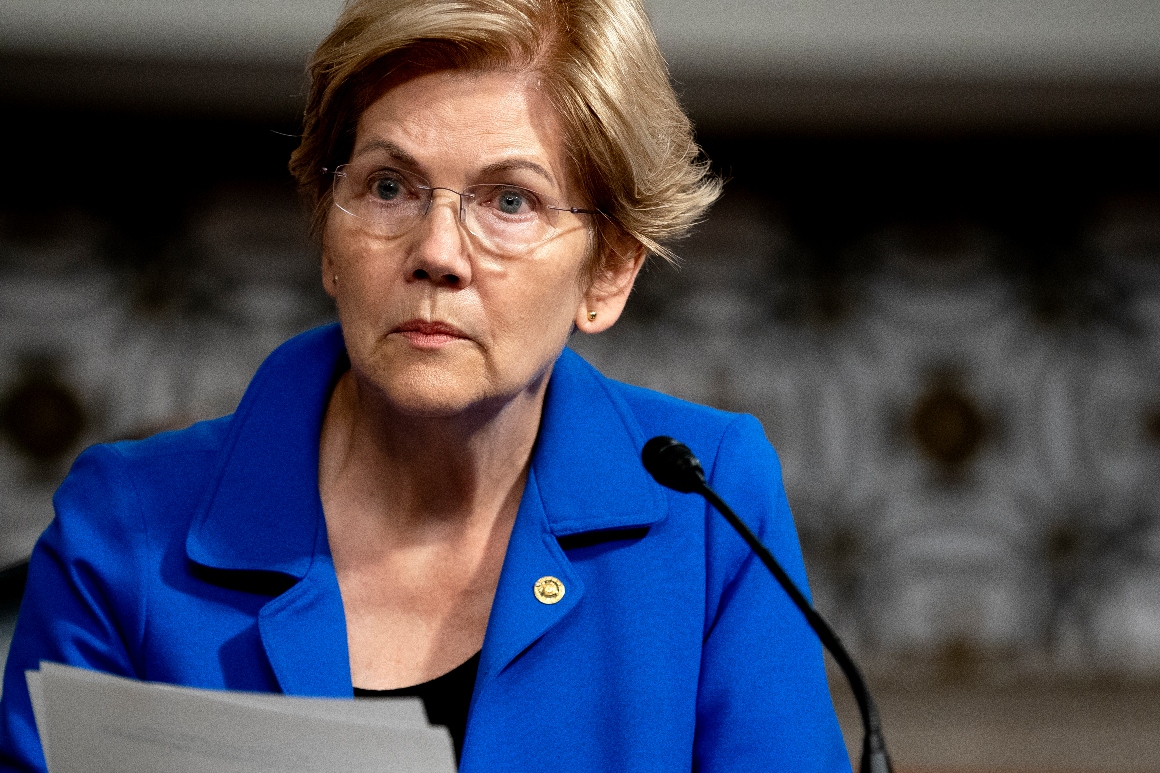
Democrats in Congress are ramping up pressure on cryptocurrency firms to show that Bitcoin is worth the wattage, amid concerns that minting digital money has become an environmental disaster.
Scrutiny from lawmakers including Sen. Elizabeth Warren (D-Mass.) and the leadership of the House Energy and Commerce Committee is triggering lobbying on behalf of so-called crypto miners who are using an escalating amount of computing and electricity to extract valuable digital tokens from the blockchain.
Critics say the practice, which grants miners digital currency in exchange for validating transactions, contributes to rising energy costs and global warming because of its use of power generated by fossil fuels. Bitcoin alone eats up about as much electricity as Ukraine, according to a University of Cambridge estimate.
The congressional oversight — which comes after Democrats in states like New York also proposed clamping down — is expected to intensify now that the U.S. is home to more crypto mining capacity than any other country, following a crackdown in China. With crypto mining now a multibillion-dollar business, the industry is fighting to make the case that lawmakers shouldn’t stand in the way of an economic boom.
“It’s not up to the government to decide if Bitcoin is important to the country’s future — that’s the market,” said Bitfury CEO Brian Brooks, who served as a top Trump bank regulator before taking the helm of the crypto mining company. “The market has spoken.”
Deciding how to address Bitcoin’s environmental fallout is the latest policy conundrum that lawmakers and regulators face with the crypto market now worth $2 trillion. While much of the focus in Washington has been on protecting consumers from financial risks, crypto mining is spilling over into the broader debate around tackling climate change.
The House Energy and Commerce Committee will have industry leaders testify at a hearing Thursday. Democrats are expected to press the executives to adopt sustainable practices, while Republicans are planning to frame mining as something the U.S. should nurture as a competitive advantage.
Lawmakers have only begun to explore what tools they have to address Bitcoin’s environmental fallout, including potential EPA regulations and state-level restrictions on power generators. For now, they’ll have to rely on political pressure to force changes, similar to how Tesla CEO Elon Musk rocked the Bitcoin market last year after he said the company would not accept the digital currency because of its fossil fuel demands.
"The extraordinarily high energy usage and carbon emissions associated with Bitcoin mining could undo much of our work to tackle the climate crisis -- not to mention the harmful impacts cryptomining has on local environments and electricity prices," Warren said in a statement. "It is time for Congress and federal regulators to step up and address the serious risks that crypto poses to our economy and our environment.”

Powering the computers that mine digital currency, as well as the cooling systems that keep them from overheating, requires a tremendous amount of energy in what's called the proof-of-work process.
Heavy-duty computer systems compete to solve cryptographic puzzles that assemble a digital currency's underlying blockchain, the decentralized public ledger that records new transactions. In return, the computer operators receive digital assets such as Bitcoin as a reward.
Because the odds of “winning” any given puzzle are low, energy costs often determine if crypto miners are profitable or not. It has become an industrial-scale process as digital currency prices have skyrocketed, with Bitcoin trading around $41,000.
A memo from the office of House Energy and Commerce Chair Frank Pallone (D-N.J.) ahead of Thursday's hearing characterizes the mining markets as being stuck in a “vicious circle.” As the value of Bitcoin and similar digital currencies grow, more miners will boot up energy-guzzling rigs to cash in.
The memo pegs the annual emissions from Bitcoin and Ethereum, another digital currency, as being equal to roughly 15.5 million car tailpipes. Ethereum backers are planning a transition to a so-called proof-of-stake process that's less energy intensive than proof-of-work.
Companies say they have powered mining farms with energy that would have otherwise gone to waste. Some develop arrangements with utility companies looking to unload trapped or stranded power. Others have hooked up their mining units to oil wells, relying on natural gas that’s typically burned off as a drilling byproduct.
“The more efficient and the more cost-effective that we run these things, and build these farms, the more money that everybody makes,” said Bit5ive CEO Robert Collazo, whose firm builds the hardware and cooling systems for Bitcoin mining rigs.
The trend is also creating new demand for fossil fuel power plants.
Missouri’s largest utility launched a pilot program to mine Bitcoin with one of its coal-fired plants last year, a move its executives said might stabilize its grid as it transitions to more intermittent sources of power like wind and solar. Bitcoin mining firm Greenidge Generation Holdings owns a former coal plant in Dresden, N.Y., that it converted to natural gas and now uses mainly for crypto.
Federal and state officials have started to clamp down.
The EPA this month rejected applications submitted by the two crypto-focused power plants in Missouri and New York to continue using waste disposal sites at their facilities.
Democrats in New York state last year attempted to pass a bill that would have imposed a three-year ban on new or renewed permits for carbon-based generators that sell their energy to proof-of-work miners, such as those that operate on the Bitcoin and Ethereum networks. The policy, which ultimately stalled in the state assembly, would have effectively shut down crypto mining operations during that period.
Warren, one of crypto's fiercest critics in Congress, has started to press miners to mitigate their energy usage and climate impacts.
"Cryptomining facilities’ energy consumption is also causing significant increases in energy costs for local small businesses and residents,” she said in a letter to Greenidge Generation Holdings, which owns the New York plant, in December. "I am concerned about this potential impact of Greenidge’s actions.”
Publicly-traded mining companies like Marathon Digital Holdings and HIVE Blockchain Technologies have bulked up their lobbying presence in recent months to make the case for the industry's job creation and clean energy efforts. The Bitcoin Mining Council, an industry group, is trying to recast mining firms as leaders in clean energy, claiming that nearly 60 percent of their power mix now comes from sustainable sources.
“If you can’t immediately see the personal value it provides to your constituents, you’re potentially going to be more apt to be more skeptical,” said Chamber of Digital Commerce Chief Policy Officer Teana Baker-Taylor, who represents crypto exchanges and mining companies. “If you don’t really understand the technology, or have never invested in Bitcoin, it’s easy to question, ‘What’s the value?'"
Mining companies such as Marathon Digital and Lancium have announced plans to link hundreds of thousands of rigs to solar and wind farms. The payments firm Block, which is led by Twitter co-founder Jack Dorsey, recently announced plans to build an open-source crypto mining business and has also funded renewable-based projects.
The industry's arguments are getting traction with Republicans, who are expected to cheer on the sector's growth at Thursday's House hearing.
A Republican aide to the House Energy And Commerce Committee said the U.S. "has an opportunity to lead here, particularly in our competition with China, and we should be working to build a regulatory environment that rewards innovation and entrepreneurship.”
----------------------------------------
By: Sam Sutton
Title: Democrats’ new climate target: Bitcoin
Sourced From: www.politico.com/news/2022/01/20/bitcoin-climate-democrats-527431
Published Date: Thu, 20 Jan 2022 04:30:21 EST
Did you miss our previous article...
https://consumernewsnetwork.com/politics-us/-why-you-can-count-on-a-biden-bounce






